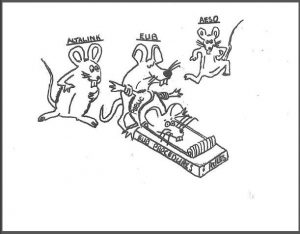When to call a spy a spy? Word wars over the EUB’s hiring of private investigators by Jeremy Klaszus, September 27, 2007, Calgary Fast Forward
“The rule of good writing is this: Write in the fewest possible words,” wrote the Calgary Eye Opener’s Bob Edwards in 1911. How, then, should one describe what the Alberta Energy and Utilities Board (EUB) did to landowners in Rimbey and Redwater? Covert intelligence gathering? Information collection for security purposes? Or, more concisely, spying?
At only six letters, “spying” follows Edwards’s rule most closely. Most news organizations, including Fast Forward, have recently described the EUB’s hiring of private investigators as a “spying scandal.” Even Toronto’s Globe and Mail headlined an editorial: “Alberta’s spy games.”
However, in a government-commissioned report, retired judge Del Perras suggests “spying” is too strong a word. He says media are using the word spy “opprobriously.” (Incidentally, no one in the Fast Forward office knew what the word “opprobriously” meant, nor did most people contacted for this story. “Opprobrious” means: “severely scornful; abusive.”)
The EUB also thinks “spy” is the wrong word. “We would agree, of course, with (Mr. Perras’s) comments,” says Tom Neufeld, an EUB spokesperson. “We’ve talked about it in terms of being security, because it has been security.” Davis Sheremata, another EUB spokesperson, has also avoided “spy” or “spying.” “That’s not a word I’ve ever used at any point in this process either internally or externally,” says Sheremata. “I’ve said all along that this was a security firm that we contracted.” (Another report recently issued by the province’s privacy commissioner suggests the EUB’s use of the word “contracted” might be a stretch, however. The report says the board hired the private investigators over e-mail “as opposed to a formal contractual agreement.”)
Jim Cunningham, a journalism instructor at SAIT, has been following the EUB news closely. Like Edwards, Cunningham says it’s important for media to use direct language instead of “completely unoffensive and meaningless” words and phrases. The CBC used the word “spy” when it broke the story in June. Since then, the province has launched two investigations into the EUB’s actions. “You could argue that the use of some direct language has helped to bring that about,” says Cunningham, adding that it’s important to make sure the facts back up the use of the word.
Canadian newsrooms follow the definitions given in the Canadian Oxford Dictionary, the official dictionary of the Canadian Press. That dictionary defines a spy as “a person employed by a country or organization to collect and report secret information on esp. the military activities of an enemy or hostile foreign state, or on the activities of a rival organization.”
In his report, Perras noted the landowners and EUB weren’t opposing parties. “In this matter there was no intent to capture information from a hostile party for the purpose of advancing the interest of an opposing hostile party,” he wrote. “The EUB was a neutral party operating a quasi-judicial panel whose role was to determine the issues raised by the application before the panel.”
However, the Canadian Oxford has more to say. To “spy on,” says the dictionary, is to “maintain a close and secret investigation or observation of a person or group.” That’s exactly what the EUB-hired investigators did, says Mount Royal College political scientist Keith Brownsey. “They’re playing with words,” says Brownsey. “They’re playing with semantics here. It was, for all intents and purposes, spying. The Alberta government was spying on Alberta citizens.”
***

Cartoon from Justice D W Perras Report on EUB’s “repulsive” spying scandal
EUB (Energy Utilities Board) was ERCB (Energy Resources Conservation Board). After the spying scandal, Alberta govt switched EUB back to ERCB; after Ernst’s lawsuit went public, govt turned it into AER (Alberta Energy Regulator).
***
Joe Anglin, the landowner who exposed the private investigators, agrees it was spying. “Sometimes we throw out words that are far stronger because of emotion,” says Anglin. “But the reality is, sometimes we’re accurate and we just need to… call a spade a spade.” Anglin says he could tell the private investigators were spying when they showed up at the Rimbey Community Centre in May. “What they were doing was trying to position themselves behind me and my computer where I sat next to my lawyer,” he says. “They followed me very closely.” But because it was planting season and the landowner group at the centre was mostly elderly ladies, the investigators stood out. “Big 245-pound guy looking just like he’s ex-RCMP, eating all the cookies,” recalls Anglin of one investigator. “It was right out of a cartoon.” [Emphasis added]
